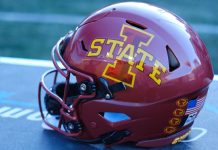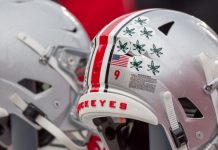With debate around name, image and likeness leading many of the discussions at the 2020 NCAA Convention this week, association President Mark Emmert used his State of College Sports address to underline the need for solutions that work for student-athletes but maintain their focus on providing opportunities for success in academics, sports and life.
Addressing delegates, he said: “We’re in the human development business. As member institutions and administrators, we create opportunities for all student-athletes, not just a few. We prepare them for the next step in their lives, whatever it is. However, some college athletes are different and live different lives – some sports generate a lot of money. We need to recognize that fact.”
Emmert’s presentation was the keynote of the convention’s plenary session, where he highlighted the work campus and athletic conference leaders have done to support student-athletes in areas like health care and academic support but challenged the group to acknowledge living in a fast-changing world.
California last year adopted legislation that would allow college athletes in the state to be compensated for their name, image and likeness beginning in 2023. In the meantime, lawmakers in more than 30 other states have introduced similar bills or intend to do so.
Last month, Emmert traveled to Capitol Hill to meet with US Senators Chris Murphy and Mitt Romney who formed a federal bi-partisan working group to examine issues in college sports. Other members of Congress have already introduced two bills related to the compensation of student-athletes for their name, image and likeness.
On Thursday, Emmert urged NCAA member institutions to consider the discussion around name, image and likeness more broadly. College sports have become a public trust, he said, and the games are much bigger than an individual, campus, conference, division or even the NCAA.
“Expectations from voices outside our membership matter,” he said. “Expectations from fans, legislators and courts matter. I regularly meet with lawmakers, and the concerns they have span much larger than just name, image and likeness. The debate is about inherent fairness. Name, image and likeness is just a symptom.”
Emmert underscored that although the NCAA is in the human development business, it does not make the association and its members immune to questions around numerous issues, including media contracts, medical expenses for student-athletes, transfer opportunities, and fairness when penalties are levied against institutions and coaches.
“These important questions are reflections of frustrations, which begs the question of who’s looking out for the students,” he noted. “This Association was created nearly 115 years ago with the express purpose of looking out for the interest of students. In the 21st century, it still should be us, so we better have better answers. It’s our job to have answers, or others will answer for us.”
He closed the session by stressing 2020 will not be business as usual. If the NCAA and its members are to build support for college sports, he indicated, it must act now and in ways that clearly reflect its values and support for students’ best interests.
“Most importantly, we need to be accountable to student-athletes and each other to make changes together,” Emmert said in conclusion. “We are best positioned to make those changes. We may need help from Congress and others along the way, but this is our job—to stay focused on what’s best for students.”














